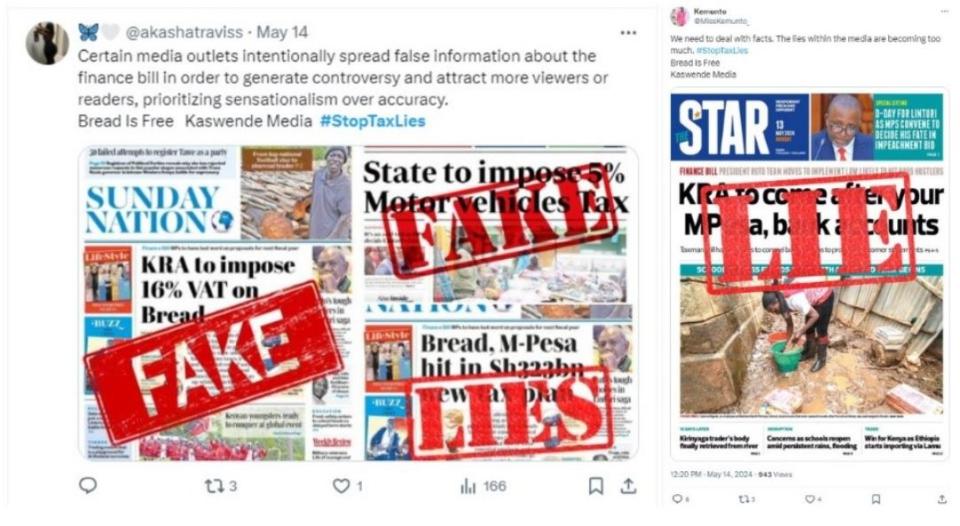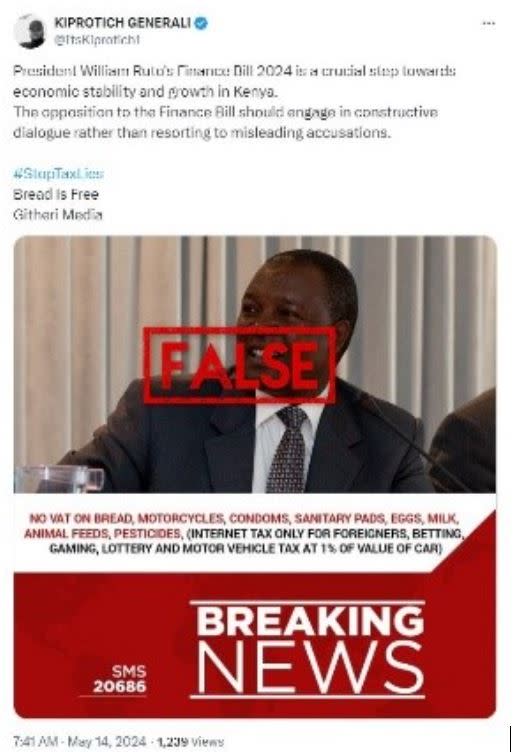Kenya pro-government campaign falsely accuses media of lying about looming tax hikes
Tensions erupted in Kenya in June 2024 over a new finance bill that could see significant hikes in levies on commodities if passed into law, affecting most of the population. A day after the bill was made public, a coordinated online campaign on X targeted local media outlets reporting on the financial burden Kenyans would face if the changes went ahead.
Red labels reading “FAKE” and “LIES” were stamped on digital versions of newspaper front pages in online posts published in May 2024 (see here and here).
Hashtags like “Stop Tax Lies”, “Bread is Free” and “Githeri Media” were used to drive the online campaign. “Githeri” is a derogatory term used to discredit the media reports.

The objects of their wrath? Headlines that read “KRA to impose 16% VAT on bread” and “Bread, M-Pesa hit in Sh323bn new tax plan”.
KRA is the acronym for the Kenya Revenue Authority, which is behind the proposed hikes.
The cash-strapped government has defended the move -- projected to raise some 346.7 billion shillings ($2.7 billion), equivalent to 1.9 percent of GDP -- as a necessary measure to cut reliance on external borrowing.
But the proposal has sparked angry protests in Nairobi on June 18, 2024 (archived here).
Critics say the new taxes will weigh heavily on a population already saddled with a cost-of-living crisis (archived here).
They follow a round of tax hikes last year that led to deadly clashes between police and opposition supporters (archived here).
However, claims that local media spread fake reports about the new bill are false.
'Bread is Free'
On May 14, 2024, X posts (see here and here ) shared a breaking news graphic with a picture of Treasury Minister Njuguna Ndungu alongside claims that the proposed law would not tax basic commodities like bread.

As a breakfast staple in Kenya, bread was one of the provisions that stood out when the bill was made public.
A similar claim was repeated on Facebook.
“No VAT on bread, motorcycles, condoms, sanitary pads, eggs, milk, animal feeds, pesticides, internet tax only for foreigners, betting, gaming, lottery and motor vehicle tax at 1% of value of car (sic),” reads the post.
But this is false.
The bill proposes several changes to the Value Added Tax (VAT) on various items, including gluten and unleavened bread, which are currently exempt but will incur a 16-percent tax if the bill passes.
Meanwhile, ordinary bread, which was previously zero-rated, will have a tax-exempt status. There is a difference between the two.
“There's a lot of misinformation about the taxes and the finance bill... driven by ignorance.”
Zero-rated goods are not taxed at the point of sale, but producers can claim back the VAT paid on inputs. While exempted goods are not taxed either, producers cannot claw back the VAT paid on inputs.
Economists warn that manufacturers would pass the cost onto consumers.
Betting, gaming and lottery services which previously attracted an excise duty of 12.5 percent will go up to 20 percent tax. Additionally, the services will lose the VAT exemption status.
Money transfer services like M-Pesa, which has over 30 million monthly users across Kenya, will also incur a hike in levies. This means subscribers will incur more costs.
Public consultation about the finance bill ended on June 10, 2024. Economists expressed concern that political disinformation might have affected people's perception.
“There's a lot of misinformation about the taxes and the finance bill... driven by ignorance,” XN Iraki, an economics lecturer at the University of Nairobi, told AFP Fact Check.
Only aimed at the rich?
Politicians and political analysts allied with the government of William Ruto say the taxes will target the rich and the middle class while leaving lower-income groups untouched.
In an interview, nominated senator Karen Nyamu dismissed protests by the poorest majority, claiming the proposed new levies would not affect them (archived here).
“You could be lamenting that Ruto is imposing heavy taxes on us. But what Ruto has done is that he has removed taxes from the lower class and imposed it, for instance, on people who are importing goods like beds,” said Nyamu.
“So, you [the lower classes], why are you complaining when it does not even involve you?”
On June 6, 2024, political analyst Mutahi Ngunyi aired similar ideas on his X account, which has 2.3 million followers.
“Ruto is only taxing the rich,” he wrote.
Dear Hustlers: What is your PROBLEM? Only 1.2 million Kenyans out of 52 million OWN cars.40 Million of YOU will NEVER own a car. Question: Why defend Car Owners if you have No Car? Also: Do Hustlers drink BOTTLED WATER or use Tea bags? NO! Ruto is TAXING the RICH. Is this WRONG?
— Mutahi Ngunyi (@MutahiNgunyi) June 6, 2024
One of the most contentious provisions of the finance bill proposes a motor vehicle tax set at 2.5 percent of the value of a car, payable every year.
In his post, Ngunyi blasted working-class “hustlers” for worrying about a vehicle tax when “40 million of you will never own a car”.
But while only a small percentage of Kenya’s 51.5 million population own vehicles, the majority who depend on public transport will still be affected by the new tax, according to Iraki.
“There’s nothing like taxing the rich because the poor are not affected; they are affected because the economy is interconnected,” the economics lecturer said.
“Whatever you do in one part of the economy affects the other.”
Consumers will offset the cost incurred through the motor vehicle tax, according to financial consultant Erastus Omolo Kwaka.
“They will face new costs, and those costs must be recovered from somebody,” Kwaka told AFP Fact Check.
Ripple effect
Multiple companies have exited the Kenyan market over high taxes while others have downsized staff, local media reported (see here and here).
On June 5, 2024, taxi-hailing companies Uber and Bolt threatened to close operations in Kenya if the new bill, which proposes a six-percent tax on gross turnover for non-resident firms, is approved.
Experts warn of an unpredictable tax system, saying it might scare off investors and slow down the economy.
The World Bank predicts Kenya’s real GDP growth will slow to five percent this year (archived report).
Parliament was due to debate the bill on June 18. It must pass the final version before the end of the month.

 Yahoo News
Yahoo News 
